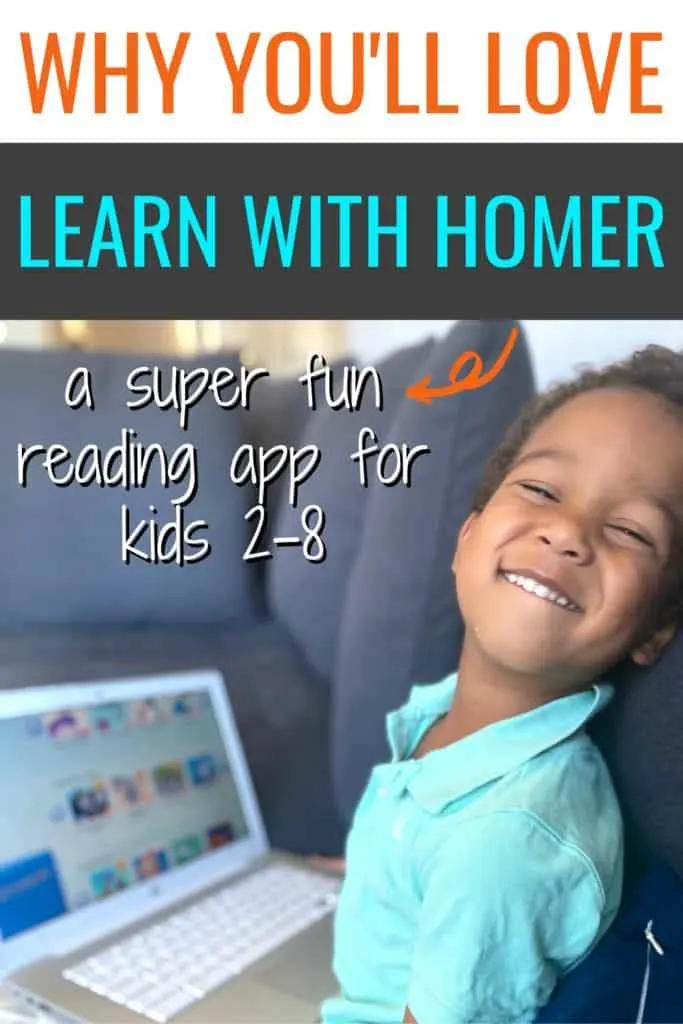So many parents around the world are trying to navigate changes in the school system this year, while also trying to figure out how to work from home. If you have young kids at home and you want to make sure they’re gaining the literacy skills you need, check out Learn with HOMER. This fun, effective app has a proven track record for equipping children with the skills they need to become successful readers.

I received free access to the HOMER app for review purposes and I was compensated for my time. All opinions are my own and I am not required to post a positive review.
Learning to Learn in New Circumstances
Several months ago, when the first stretch of lockdown first began, the activities of our home changed overnight. Sure, we’ve always been homeschoolers, so we did spend a lot of time at home already, but we also spent a lot of time outside the house. We went to classes, met up with friends, took field trips, and sent our preschooler to part-time daycare.
Suddenly life looked really different and my initial reaction was to try to make it seem like a holiday for my children. I thought that if we had to be locked inside, I could keep their frustration and fears at bay by making it really fun. My husband was out of the country at the time and I was already at the end of my rope: this strategy was all I had.
So, we started watching movies in the middle of the day and watching YouTube videos and playing on the computer and, like the rest of the world, baking a lot. (And eating a lot more too.)
Like most people, I thought this would only last for a few weeks or a couple of months at most. I didn’t expect it to go on for half a year or longer. Eventually, I realized we couldn’t go on like this is a holiday forever. We need to put everything back in place. We need some structure to our days.
One of the most challenging parts of the lockdown was the four-month closure of my three-and-a-half-year-old son’s daycare. Normally, he goes there two to three days a week and he gets a lot of his social interaction there with other people his age as well as an adult who is gifted with the patience to be with three-year-olds all day.
He also spends a lot of his time there learning new skills and concepts that I don’t necessarily have the time to teach him at home right now.
With daycare closed, it seemed like as good a time as any to start giving him his own homeschool curriculum, and his own set of goals and learning outcomes that we want him to achieve this year.
My parenting philosophy—if you can call it that—has always relied heavily on the belief that teaching a child to read early is important not just for them but also for their parents. Once a child can read, they can find information on their own. They can answer some of their own questions. They can entertain themselves for hours. Huzzah!
Why We Need a Reading App for our Preschooler
So, I decided to set him up with a reading app. I have had really good success over the past couple of years with my six-year-old daughter learning how to read with an app and I thought I would get a head start with my son as well. After looking around at a few different options, we decided to try HOMER with him.
HOMER is a reading app created by a team of teachers, who use scientifically-proven methods of phonics instruction. This online reading program contains thousands of personalized lessons, stories, and activities to help kids develop and grow their reading skills. the activities are fun, varied, and engaging enough to hold the attention of even the busiest preschooler for as long as you’ll let him play with it.
But more importantly, it’s effective. Its play-based learning approach teaches children crucial early language skills such as recognizing letters, identifying sounds, blending sounds, and segmenting sounds. It offers countless opportunities for children to practice and review the concepts they’re learning.
How the Learn with Homer Reading App Teaches Kids to Read
They hear stories and read the corresponding text as each word lights up. Over time, they come to associate those words with the sounds they hear because they’ve frequently seen and heard them associated with each other.
The activities in the HOMER reading app fall into 4 main categories: stories, create, letters, and learning games. When you sign up for the app, you fill out a survey about your child’s interests and abilities. As they progress through their learning path, the app automatically selects the best activities for them. You can also access any of the activities at any time by clicking on the Practice Tab on the app’s homepage.
Here’s an overview of the types of activities available in the app—it’s easy to see why kids don’t want to put it down.
- Stories: educational songs and stories with sing-along style captions. Kids can choose to autoplay the stories or read them on their own. Topics include:
- Favorites
- New and Noteworthy
- HOMER stories
- Power words
- Nursery rhymes
- Vehicles
- Princesses
- Dinosaurs
- Monsters
- Pets
- Animals
- ABC and 123
- Fairy tales
- Dancers
- Robots
- Sports
- Science
- Outer space
- Bugs
- Superheroes and pirates
- Ocean adventures
- Sesame Street
- Holidays
- Create: Making pictures with stickers and coloring a variety of pictures
- Make Your Own Story: Animals
- Make Your Own Story: Make Believe
- Make Your Own Story: Vehicles
- Make Your Own Story: Sports
- Make Your Own Story: HOMER and Friends
- HOMER Drawboards
- Letter Drawboards
- Drawboard: Imagination
- Make Your Own Story: Holidays
- Letters: Activities that help kids interact with and familiarize themselves with the letters of the alphabet.
- Dress the Letters
- ABCs
- Meet the Letters
- Hunt for Letters
- Letter puzzles
- Games: Educational games that help kids develop skills that support reading readiness.
- Colors
- Shapes
- Let’s Listen
- Tap the Word (matching pictures with spoken words)
- What do you hear?
- Not the same
- Cat’s Meow (finger movement exercises, i.e. tracing a line with your finger)
- Memory games
- Make a Story (finding pictures to match a sentence)
Kids plus Screen Time…A Good Mix?
But what about the whole not putting it down thing? Is it healthy for children as young as two to be spending time playing on a phone, tablet, or computer? When my older daughters (now 11 and 13) were younger, I believed the answer to that question was a very firm NO. In fact, I was pretty draconian about keeping tech gadgets out of my children’s sphere.
But oh, how times have changed, though, and not just because of the lockdown and the endless challenge of entertaining young kids at home while trying to conserve some modicum of energy for your other work.
For one thing, screens are ubiquitous now. Every time our children turn around, they are confronted with a multitude of screens. Escaping them all together would be relatively impossible. That’s why I prefer to choose educational screen time over entertainment-only screen time. If my kids are going to have screens in their lives, I want them to benefit from that experience. I want them to learn something new, accomplish a task, or connect with their friends and family.
Second, you might be surprised how little screen time it actually takes to see your child progress in their ability to read. According to a study of HOMER’s efficacy conducted at NYU, the reading scores of kids using HOMER are proven to increase by 74% in just 15 minutes of practice per day. Fifteen minutes is just over two thirds the length of an episode of Paw Patrol. Just saying.
Finally, sometimes it’s just a downright necessity. Let’s be honest: we all have work to do. More people are working from home than ever before and more kids are spending more time at home (and learning at home) than they (and we) are used to. Sometimes as parents, we just need a break.
We need to have something we can hand to our kids and say, “Please play your games for fifteen minutes so Mommy can have a phone call…or drink a (hot) cup of coffee…or, you know, think a whole thought.” For us, HOMER fits this need perfectly.
My son has been using the program for just over a month and he is hooked. He calls it “My account” and asks me for it every day.
He is obsessed with HOMER’s dump truck video. He gets to hear a song about construction vehicles and see each word highlighted as it’s sung. At the same time, he’s learning what these vehicles do and how they work. You’ll never believe how catchy a song about a dump truck dump, dump, dumping its load can be!
If your kids are pre-readers, early readers, or struggling readers, I highly recommend you check out the HOMER app and see if it might be a good fit for your family. Sometimes all it takes for a struggling reader to become an avid reader is for a key to click in their head and open a new door of understanding. I really think HOMER has the capability to unlock such doors.
Also, now is a great time to try it. HOMER’s offering a back-to-school special: Get a family membership for up to 4 kids for just $45/year (a 60% discount!). Want to check it out first? Sign up for the 30-day free trial today by clicking the image below.

Sophie Agbonkhese is a writer, homeschooling mother of four, and a recovering overachiever (who occasionally relapses). She is the founder of My Cup Runs Over, a site dedicated to helping busy women simplify and enrich their lives. When she’s not writing or debugging websites, Sophie spends her time reading, dancing, bullet journaling, reading, gardening, listening to audiobooks, and striving fruitlessly to have a clean house for at least five minutes.

